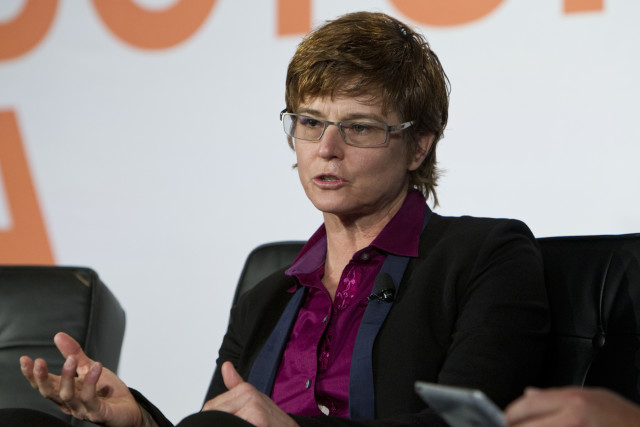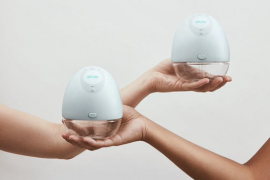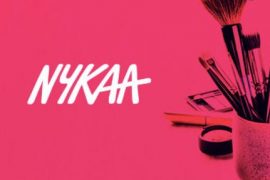Ramona Pierson - CEO, Declara
Declara is a type of social network that links everyone in a company or an organization. With the help of algorithms developed by Ramona Pierson; Declara’s system learns how people interact, what types of questions they’re looking to answer, and who can best answer them.
Ramona Pierson, served as a mariner for 22 years; and she spent most days stuck in an office at the El Toro air station near Irvine, Calif. She was good with math and held top-secret assignments, creating algorithms to aid fighter attack squadrons. Pierson enjoyed the covert puzzling.
As a kid growing up in Waco, Tex., and Southern California, Pierson discovered she could do math in her head. Rather than pulling out pencil and paper, she’d use techniques akin to meditation and visualization to process equations. Pierson joined the Corps at 18 in exchange for two years of college tuition. She soon started writing algorithms to help calculate the position of Russia’s nuclear silos and guide F-18 fighter missions. She was also an exercise addict: and was once nominated her the fittest person on the base. Four years later, in April 1984 Pierson was involved in an accident at Irvine intersection. She spent 18 months in a coma following the incident and woke up blind. She however, didn’t lose mathematical mind.
The blindness was terrifying, but it also forced her to expand her ability to solve puzzles in her mind. “I learned to create a cognitive map of the world, sort of like The Matrix,” she says. The following is an excerpt of Jenna Schnuer’s – of the Entrepreneur- discussion with Pierson about Declara
Ramona Pierson, CEO of Declara, doesn’t believe in a one-size-fits-all world. Rather, she sees a future in which learning is personalized.
She launched Palo Alto, Calif.-based Declara in 2012 to develop a technology platform that creates learning experiences based on a person’s user profile and interactions with data. Instead of hammering people with too much too quickly, the
system delivers the information and resources users need, precisely when they’re ready for it.
Declara uses machine learning, algorithms and recommendations to create a “learning path” for each individual based on how they interact with data, both informational (websites, documents) and social (tweets, blog posts).
“Declara is about helping people be lifelong learners,” Pierson explains. “We really look at their intentions and interests so we can automate the ontologies of learning pathways … and pull in open content and proprietary content into learning packages and be able to recommend those to them. And next year, we’ll start bringing in biometric data to really help.”
Before starting Declara, Pierson ran a company that partnered with McGraw-Hill Education to launch a product called the “Power of U” to teach mathematics to grade-school students.
“We saw very quickly that we were able to take kids who were lagging behind in math by three years and catch them up to their age peers in six weeks by really changing the modality of learning to match the kids’ preferences and how they actually learn,” Pierson says. “So I thought, Well, can we create a company that can do this at scale?”
Scale indeed. Declara’s first client was Education Services Australia, which brought the company on to help introduce teachers to a new curriculum. Declara has since started working with the teachers’ union of Mexico (1.6 million teachers strength)
and in Puerto Rico. To further its international reach, the company has created subsidiaries in Mexico and Singapore and is building one in Brazil.
But educators aren’t the only learners who can benefit; Declara has also introduced a platform for enterprise learning. The company is in its second year of working with biotech firm Genentech. “It really helps with the onboarding of new employees and moving people into becoming managers or high-level executives,” Pierson says.
And come spring, Declara will launch a “prosumer” version for individual use. “Imagine people who may have health issues. We can start to build automated pathways for individuals who are trying to hit goals of losing weight or hitting those metrics to change their lives.” Think of the system as a more targeted Google, one in which only useful information makes it through to the user’s workspace.
A neuroscientist and former Mariner, Pierson had one experience that taught her—the very hardest way—how difficult learning can be. Struck by a drunk driver when she was 22, Pierson spent 18 months in a coma and then had to relearn pretty much everything.
“What would have been amazing for me is to have been able to receive curated content and curated experts to really help,” she says. “The thing about Declara is we’re not using machine learning to remove the human, but to actually bring in the expertise of other people into our learning experience.”




